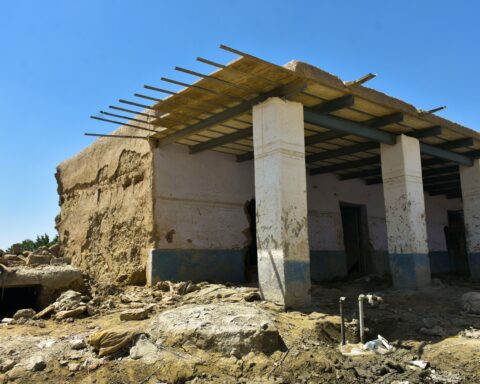In Pakistan, where retirement homes do not exist, children consider it a moral duty to take care of their parents as they age.
Asad Khan says this is why he wanted to sponsor his father last year after his mother passed away. His sisters are married, and his elder brother lives in Jeddah, Saudi Arabia.
Khan, who works in Toronto as a human resources manager, couldn’t apply for his father’s sponsorship immediately as the annual cap of 5,000 applications is usually reached soon after Immigration, Refugees and Citizenship Canada (IRCC) begins accepting applications the first week of January each year.
Therefore, Khan opted for the super visa, which has an approval rate of 85 per cent and takes a maximum of eight weeks instead of the four or more years it takes to process a regular sponsorship.
Khan was happy that he did not have to meet the required minimum income needed – a pre-requisite of sponsorship – or have to wait in a long queue to process his father’s application.
“Because of [the] super visa, my father is not alone back home and waiting anxiously.”
“Because of [the] super visa, my father is not alone back home and waiting anxiously,” says Khan. “In fact he can travel back frequently.”
Khan managed to get the visa in five weeks after buying medical insurance for his father, which must be renewed every year.
Elderly are not a burden
Sikander Lalani, CEO of Lalani Associates, a leading immigration consultancy provider in Pakistan, says that relocating in Canada is often not the preference of elderly Pakistani people, as they do not want to leave their homeland, culture, family and religious values at such a tender age.
The only exception to this is if the situation is critical to the extent that there is nobody to take care of them back home.
“The number of dependent parents who opt to settle in Canada is not more than 10 per cent of the total immigrants from Pakistan,” says Lalani.
“They come here not for medical or other financial benefits, but only for [the] love and affection they carry for their kids.”
More Pakistani parents and grandparents prefer to shuttle back and forth between the two countries, Lalani explains. Those who have financial constraints and health issues will not visit frequently.
“They come here not for medical or other financial benefits, but only for [the] love and affection they carry for their kids,” he adds.
Khan says many Pakistani people who are elderly do not prefer to live in Canada because of the harsh weather, which is usually tough for them to bear, as is staying indoors for most of the year. Cold weather can also aggravate some of their medical conditions.
In 2013, former Immigration Minister Jason Kenney stated that the health-care costs of elderly immigrants creates a burden on the Canadian health-care system and other social resources. He further noted that a set of grandparents could cost the system $400,000.
Lalani refutes the claim. “What burden are they talking about?” he asks.
“They get [a] sponsorship fee. In return two family members – husband and wife – are contributing to [the] economy and paying hefty taxes. Later the kids – an average Pakistani family has three – will follow suit as [the] next generation. Is this a burden or constant contribution to [the] economy?”
Family reunification reforms needed
When it comes to the reunification of spouses or children with their families, Lalani says that laws should not disrupt the basic structure of a family. He says that now, the biggest hindrance is the time consumed by the process, which varies between six months to four years.
“It’s a trauma for a skilled person that he is away from his family – a mental torture.”
“It’s a trauma for a skilled person that he is away from his family – a mental torture – how could you expect someone to concentrate on his job or studies or overall performance in a totally new environment with a stress that seems endless?” asks Lalani.
Prime Minister Justin Trudeau promised reforms to the 2013 family reunification program during his election campaign.
He pledged to double the number of parents and grandparents’ applications accepted from 5,000 to 10,000 and speed up the processing time, but Lalani says that it will take time to materialize.
“It was a political statement, as the change in policy will face resistance from bureaucracy and making it a law is time consuming so it won’t trigger that fast.”
The changes made in 2013 to the immigration rules also increased the minimum necessary income (MNI) to sponsor parents and grandparents by 30 per cent and reduced the maximum age of dependents from 22 years old to 18.
“I think the Canadian government needs to work fast paced on the re-location of the basic family structure and also reversing the minimum age of dependent children from 18 to 22, because in Asian culture children under 23 are dependent on their parents unless they are married,” says Lalani.
He notes that the pledge made by Trudeau did not say much on the MNI required for sponsors.
“It was criticized as a benefit for high-net worth [individuals],” Lalani says. “This still needs to be reconsidered as elderly people are not a burden at all.”
Journalist Priya Ramanujam mentored the writer of this piece through the NCM Mentoring Program.
Tazeen is based in Mississauga and is a reporter with the New Canadian Media. Back in Pakistan where she comes from, she was a senior producer and editorial head in reputable news channels. She holds a master’s degree in Media and Communication and a certificate in TV program production from Radio Netherlands Training Center. She is also the recipient of NCM's Top Story of 2022 award for her story a "A victim of torture, blogger continues fight for human rights in Pakistan"





